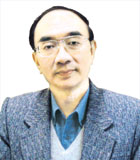![]()
Gear Up | Winning Words
Broaden Your Network | Learners' Light | Enrich Your Readings
On Education
On Education - Interviews with professors and department heads cover the hottest courses available at the eight higher education institutions and the resulting career opportunities.
|
A classical education
by Edward Chung
The study of Chinese language and literature is often seen solely as a springboard to a classroom career. But, although a good number of graduates in this subject end up as schoolteachers, this is by no means the only career path available. Li Ka-shing, for example, is an avid fan of the Chinese classics and fully supported his son Victor's decision to study Chinese literature at university. "Society does tend to pigeonhole Chinese literature students into teaching careers, but the range of options open to our graduates is largely dictated by economics," comments Dang Shu-leung, professor and chairman of the Chinese University of Hong Kong (CUHK)'s Department of Chinese Language & Literature. "When the economy is doing well, graduates can find employment in just about any non-specialised industry. We've seen cases where our students have gone on to executive positions or into web editing and design, especially during the dot com bubble." However, now that business is not so good, most graduates are gravitating towards careers that feel safe and familiar. Prof Dang notes that this cycle has also led to an increase in the number of students from the department who choose to take postgraduate courses, with recent annual figures rising to about 30 to 40, including those who opt for the Postgraduate Diploma in Education. "Part of this increase is also because the government is implementing a requirement for all new teachers to have a postgraduate teaching qualification or [the] equivalent," he says. "This has made life a little more difficult for our students, especially given the number that go into teaching. Other career options for fresh Chinese literature graduates are generally those that require strong language abilities and a stylistic sense, such as publishing. Some have even found careers in creative writing and we've had a couple of students win regional literature prizes." Educating the masses A number of commentators maintain that the standard of university students has fallen, in particular with regard to their ability to express their ideas and communicate. Prof Dang feels that this is not necessarily true, although he accepts that not all students will aim for top honours. "The number of students has greatly increased over the past 20 years or so," he explains. "Previously, only about two or three percent of secondary school students got into university; the number of higher education spaces has risen, thanks to the fact that Hong Kong now has eight institutes of tertiary education." Ever since the introduction of new universities and the conversion of higher education institutes into fully-fledged universities, the increase in the higher education supply has opened up tertiary studies to a whole new generation. "These days, about 17 to 18 percent of secondary school students get to university," adds Prof Dang. "So the talent hasn't disappeared - the best students are as talented as they've ever been - but now we must also cater to students who aren't quite as gifted." Prof Dang says that the perception that student quality has dropped is probably due to today's many competing distractions for young minds, such as television or video games. "However, in the 30 years I've been teaching Chinese literature, it has become apparent that the level of students' ability has not so much declined as changed over time," he notes. "This does not necessarily mean that the current batch of students is any worse than their predecessors, but the nature of their work is different. For example, the subject used to involve lots of library work, but these days much of that can be done on computers through Internet searches. Still, CUHK periodically publishes volumes of our students' degree theses and most observers say that the quality of work has not declined over the years."
Taken from Career Times 2003/06/27 |
|||||||
(11-20 of 68)
A booming market
(2003/07/25)
A leader or a follower...
(2003/07/11)
A classical education
(2003/06/27)
Training for an engineered world
(2003/06/13)
In the market for professionalism
(2003/05/30)
A broader outlook on business
(2003/05/16)
Building a career from the ground up
(2003/04/11)
No ordinary language school
(2003/04/04)
The business of learning
(2003/03/28)
Using geography to understand the world
(2003/03/14)
(11-20 of 68)


